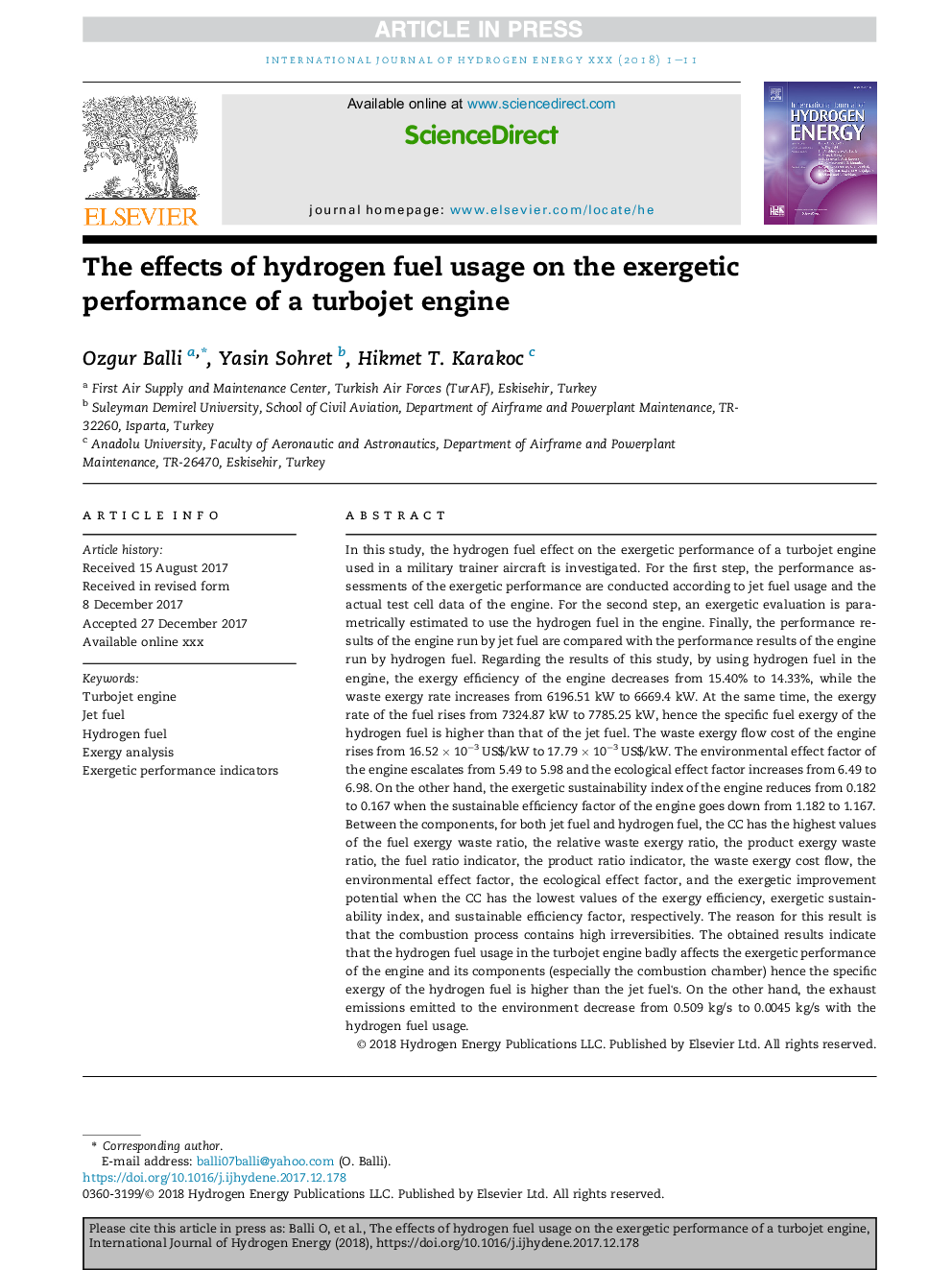| کد مقاله | کد نشریه | سال انتشار | مقاله انگلیسی | نسخه تمام متن |
|---|---|---|---|---|
| 7705938 | 1497302 | 2018 | 11 صفحه PDF | دانلود رایگان |
عنوان انگلیسی مقاله ISI
The effects of hydrogen fuel usage on the exergetic performance of a turbojet engine
ترجمه فارسی عنوان
تاثیر مصرف سوخت هیدروژن بر عملکرد فوق العاده موتور توربوجت
دانلود مقاله + سفارش ترجمه
دانلود مقاله ISI انگلیسی
رایگان برای ایرانیان
کلمات کلیدی
موتور توربوجت، سوخت موشک، سوخت هیدروژن، تجزیه و تحلیل اگزرژی، شاخص های عملکرد شدید،
موضوعات مرتبط
مهندسی و علوم پایه
شیمی
الکتروشیمی
چکیده انگلیسی
In this study, the hydrogen fuel effect on the exergetic performance of a turbojet engine used in a military trainer aircraft is investigated. For the first step, the performance assessments of the exergetic performance are conducted according to jet fuel usage and the actual test cell data of the engine. For the second step, an exergetic evaluation is parametrically estimated to use the hydrogen fuel in the engine. Finally, the performance results of the engine run by jet fuel are compared with the performance results of the engine run by hydrogen fuel. Regarding the results of this study, by using hydrogen fuel in the engine, the exergy efficiency of the engine decreases from 15.40% to 14.33%, while the waste exergy rate increases from 6196.51Â kW to 6669.4Â kW. At the same time, the exergy rate of the fuel rises from 7324.87Â kW to 7785.25Â kW, hence the specific fuel exergy of the hydrogen fuel is higher than that of the jet fuel. The waste exergy flow cost of the engine rises from 16.52Â ÃÂ 10â3 US$/kW to 17.79Â ÃÂ 10â3 US$/kW. The environmental effect factor of the engine escalates from 5.49 to 5.98 and the ecological effect factor increases from 6.49 to 6.98. On the other hand, the exergetic sustainability index of the engine reduces from 0.182 to 0.167 when the sustainable efficiency factor of the engine goes down from 1.182 to 1.167. Between the components, for both jet fuel and hydrogen fuel, the CC has the highest values of the fuel exergy waste ratio, the relative waste exergy ratio, the product exergy waste ratio, the fuel ratio indicator, the product ratio indicator, the waste exergy cost flow, the environmental effect factor, the ecological effect factor, and the exergetic improvement potential when the CC has the lowest values of the exergy efficiency, exergetic sustainability index, and sustainable efficiency factor, respectively. The reason for this result is that the combustion process contains high irreversibities. The obtained results indicate that the hydrogen fuel usage in the turbojet engine badly affects the exergetic performance of the engine and its components (especially the combustion chamber) hence the specific exergy of the hydrogen fuel is higher than the jet fuel's. On the other hand, the exhaust emissions emitted to the environment decrease from 0.509Â kg/s to 0.0045Â kg/s with the hydrogen fuel usage.
ناشر
Database: Elsevier - ScienceDirect (ساینس دایرکت)
Journal: International Journal of Hydrogen Energy - Volume 43, Issue 23, 7 June 2018, Pages 10848-10858
Journal: International Journal of Hydrogen Energy - Volume 43, Issue 23, 7 June 2018, Pages 10848-10858
نویسندگان
Ozgur Balli, Yasin Sohret, Hikmet T. Karakoc,
